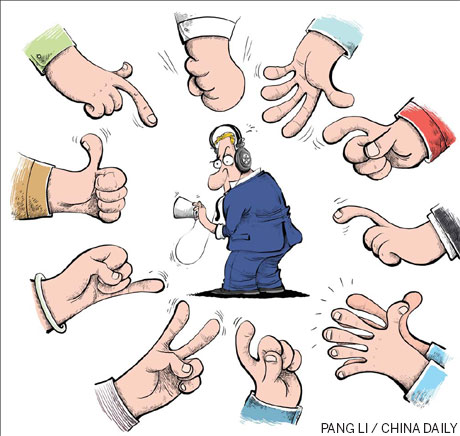X-Ray
Journalistic ethics, an oxymoron?
Updated: 2011-07-22 11:37
By Raymond Zhou (China Daily)

Britain's phone hacking scandal may have few obvious parallels in China, but it has thrown up a host of questions on the role of the press.
The Chinese press is devoting pages and pages to the phone hacking scandal that is unfolding half a world away. Yet, our focus has been somewhat different.
Until Wendi Deng leapt to protect her husband, the mighty media mogul Rupert Murdoch, from the foam-pie-throwing assailant, it seemed the story did not exactly have a Chinese angle.
Or does it?
News of the World was not a newspaper many Chinese had read, or heard of, for that matter. And many of us do not really know what to make of the voicemail interception that toppled it. Usually there are two camps that take opposing views on breaking news, especially international news from a Western country.
The liberal camp in China would see mostly positive things about how Western countries deal with a crisis, vis-a-vis what might have happened in China under similar circumstances, and the conservative pundits would draw the invariable conclusion that, "They are worse than us".
Strangely, I have not seen such a divide on the interpretation of the phone hacking scandal that is rattling the foundations of the British establishment. Not yet. Part of the reason, I presume, is the seeming absence of parallels between the news industry in the West and that in China.
Would a Chinese newspaper encourage its reporters to tap into the phones of newsmakers? Would it be punished if it was found out? Would its boss be summoned to a hearing by the People's Congress or some legal agency?
These are totally hypothetical questions because the news business is very different in China. Until a decade ago, it was not even perceived to be a business. Its profit-making potential did not come to light until a stable of metropolitan dailies, mostly tabloids, emerged to capture a significant share of the market.
Market-oriented media organizations operate very differently from traditional ones that depend heavily on press releases and government functions. I remember taking an executive from a powerful news outlet in China on tour in the United States in the late 1980s. After hearing his American peers complain about finding parking while rushing to a news scene, he said: "My reporters have no need to worry about that. News simply does not happen before they arrive."
I couldn't count how many jaws dropped in that room. By "news", of course, he was referring to official meetings, award ceremonies, and so on. You can say that kind of "news" was staged for reporters.
If you're essentially bribed to air or print something, it is inconceivable that you'll have to go to the lengths of phone-hacking or bribing the source for news. China may not have traversed the full spectrum of news gathering and reached the other extreme yet, but it is on its way. So, we could have more diverse perspectives than most. Instead of picking the "right" approach, we may ask: Of the two extremes, which is the lesser evil?
A Chinese member of the press is caught between a rock and a hard place when it comes to commenting on the malpractices at News of the World. Even before I decided to write this column I knew I'd be accused of the pot calling the kettle black. There is simply no right position I can take safely on the incident. Side with Murdoch and you're birds of a feather; jump on Murdoch and people will say, "What right do you have?"
As a matter of fact, I have more questions than positions on this case. For example, phone tapping is illegal, but what about following people around in vehicles or hiding under their residence's windows? Both intrude on citizens' privacy. Of course, you can argue the road is a public space, but the distress one can cause is probably no less than that from eavesdropping on their phone conversation, not to talk of causing traffic fatalities, as in the case of Princess Diana. What about subterfuge, pretending to be someone else in order to get information?
The urge to get scoops is driven home to every reporter. In the aftermath of a family tragedy, every news organization wants to talk to the immediate family member, who may have to repeat the same story dozens of times and suffer psychological pain as a result. What is the right thing to do in such a situation when news gathering is clearly at odds with the best interests of the newsmakers? Taking a larger picture, were we sure the Sichuan earthquake survivors really wanted to share their harrowing stories?
Public interest is often cited as the rationale for certain unusual practices. If phone hacking uncovers a conspiracy that threatens public security, does it become more palatable if it is still unlawful? What if such activities lead to the prevention of a major catastrophe of the magnitude of Sept 11?
The scandal at News of the World had been brewing for years with two convictions and several resignations, but it did not turn into a full-blown disaster until the hacking victim was a teenage girl, Milly Dowler, who went missing in 2002 and whose perceived chance of survival was enhanced in the eyes of family members when the hacker deleted voicemail messages to make space for more incoming messages.
In other words, the news reporters were messing with the news event they were reporting on - in this case, a victim of a heinous crime. You can say, it is the palatability, more than the legality, that makes the difference.
Here in China, many areas of public interest are not transparent and politicians' private lives are off limits to the press. That leaves showbiz as a free-for-all for reporting. A few years ago, when paparazzi made their first appearance in this country, a lot of celebrity entertainers were shocked. They queried the public and the public sided with them, denouncing the anything-for-scoops media circus. However, the public also flocked to such media platforms. They say they hate ill-gotten celebrity gossip, but do not hesitate to pay for it.
Now, imagine some investigative reporters use phone hacking or other illegal means to uncover secrets. You can rest assured they'll be hailed as heroes if the secrets are sins of the rich and powerful. The funny thing is, in China, some of these newsmakers are so hungry for the spotlight they will divulge private information online without any journalistic coercion. Maserati-driving Guo Meimei and eloping-with-mistress-then-coming-home-to-wife Wang Gongquan come to mind.
On a more serious note, the revelation of the cozy relationship the News of the World people cultivated with the police and the government makes me wonder whether it is an individual case or is typical of all the press in the United Kingdom. As a watchdog, the press should keep a distance from the establishment. Being in bed with the powers-that-be can get you scoops, but will destroy your credibility. It is a fine point often lost on those who hold or confer power, who prefer loyalty from the media rather than tough questions or perceived antagonism.
Another specter raised in this scandal is the monopoly of media power. News Corp is a media empire with multiple properties in the UK and the US. When they speak with one voice, it is not good for the public interest. The media should reflect the diversity of public opinions. If one or a few voices are so strong as to drown out the others, variations of one voice get mistaken for a chorus of opinions.
Journalistic conventions vary from place to place, but the general principle is the same: to pursue the truth, and do it in an ethical way.
It is easier said than done.

Specials

Biden Visits China
US Vice-President Joe Biden visits China August 17-22.

Star journalist leaves legacy
Li Xing, China Daily's assistant editor-in-chief and veteran columnist, died of a cerebral hemorrhage on Aug 7 in Washington DC, US.

Hot pots
Tea-making treasures catch the fancy of connoisseurs as record prices brew up interest